INTERNACIONAL
Biden’s stunning exit, one year later: The dropout heard around the country
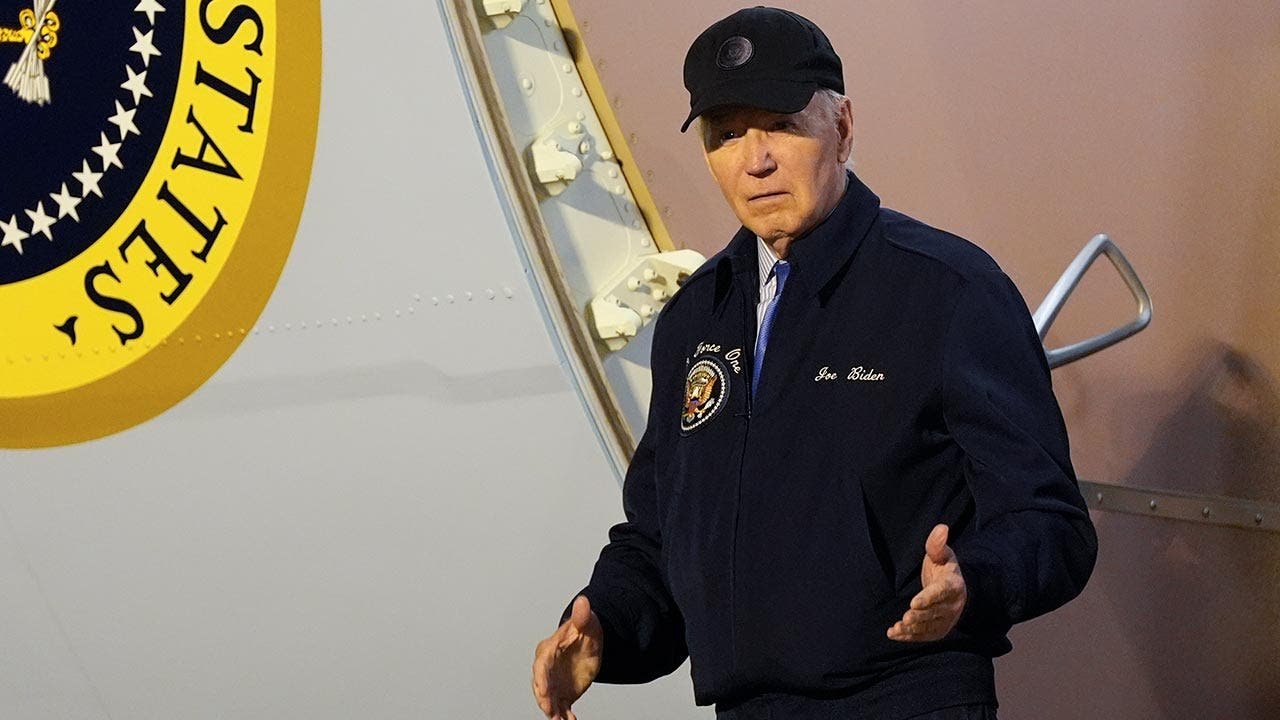
NEWYou can now listen to Fox News articles!
Former President Joe Biden suspended his re-election bid one year ago Monday, in an unprecedented move that ended his more than 50-year career in politics and rocked the Democratic Party, with those on the left still reeling from the impact.
On July 21, 2024, days after President Donald Trump accepted the GOP nomination, Biden ended his re-election campaign amid mounting pressure from within his own party.
FLASHBACK: BIDEN ENDS BID FOR SECOND TERM IN WHITE HOUSE AS HE DROPS OUT OF HIS 2024 REMATCH WITH TRUMP
The unprecedented announcement came as an increasing number of Democrat lawmakers had started to publicly call for Biden to step aside, and the party’s leadership reportedly was engaged in efforts to convince Biden, then 81 years old, he could not win the November 2024 general election against Trump.
Days after President Donald Trump accepted the GOP nomination, then-President Joe Biden ended his re-election campaign amid mounting pressure from within his own party. (Andrew Harnik, File/The Associated Press)
Doubts about Biden’s viability at the top of the Democratic Party’s 2024 ticket began seeping out into the mainstream after his halting delivery and awkward answers were placed on full display for a national audience during the June 2024 presidential debate with Trump in Atlanta.

Then-President Joe Biden and then-former President Donald Trump participate in the first Presidential Debate at CNN Studios in Atlanta on June 27, 2024. (Kyle Mazza/Anadolu via Getty Images)
The performance sparked widespread panic among Democrats and almost immediately spurred calls from political pundits, editorial writers and some party donors for Biden to step aside as the party’s 2024 standard-bearer.
As Biden struggled to regain his footing, an increasing number of House Democrats publicly urged the president to end his re-election bid.
Biden huddled with worried Democrats, including governors and congressional leaders, in the wake of the debate debacle and was also engaged in «working the phones,» according to campaign officials.
Biden began the week of his withdrawal in a defiant posture, telling congressional Democrats he was committed to campaigning against and beating Trump. Biden also urged lawmakers to stop focusing on the debate and end the calls for his withdrawal — pleas that he said only helped Trump.
Biden followed that up with a call with members of the Congressional Black Caucus and also gained the support of members of the Congressional Hispanic Caucus.
EXCLUSIVE: WHITE HOUSE INVESTIGATING BIDEN USE OF AUTOPEN IN SPRAWLING PROBE OF ‘INCOMPETENT AND SENILE’ FORMER PRESIDENT
However, concerns mounted and intensified. Democratic lawmakers met behind closed doors hoping to come to a consensus and support the president, but some were hesitant.
The Biden campaign met with Senate Democrats on Capitol Hill and, for days, the White House, the Biden campaign and the president himself said Biden had no intention of dropping out of the race.
Then-White House press secretary Karine Jean-Pierre had told reporters that the president was «absolutely not» considering dropping out.
Additionally, Quentin Fulks, the principal deputy Biden campaign manager, emphasized that «the president is in this race to win it. He is the Democratic nominee.»
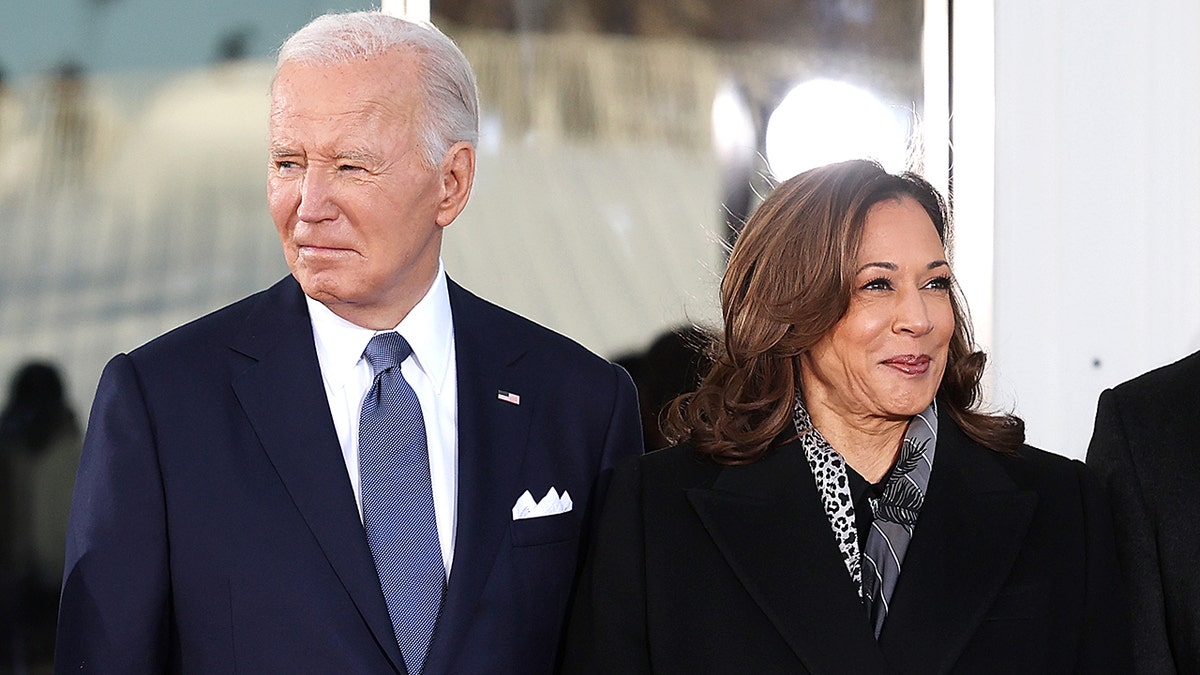
Then-President Joe Biden and then-Vice President Kamala Harris stand together at the White House ahead of the inauguration of President-elect Donald Trump on Jan. 20, 2025 in Washington, D.C. (Win McNamee/Getty Images)
On the day after the presidential debate, Biden acknowledged at a rally in Raleigh, North Carolina, «I know I’m not a young man, to state the obvious.»
Upon suspending his campaign, Biden quickly endorsed Vice President Kamala Harris to take his spot at the top of the ticket. She received the party’s presidential nominee weeks later at the Democratic National Convention in Chicago.
Months later, Trump defeated Harris in a stunning, landslide victory, sweeping all swing states and delivering him a win in not only the Electoral College, but the popular vote as well.
The Democratic Party is still grappling with Biden’s withdrawal a year later, looking for a new standard-bearer, while the former president and his team fall under investigation by both the executive and legislative branches.
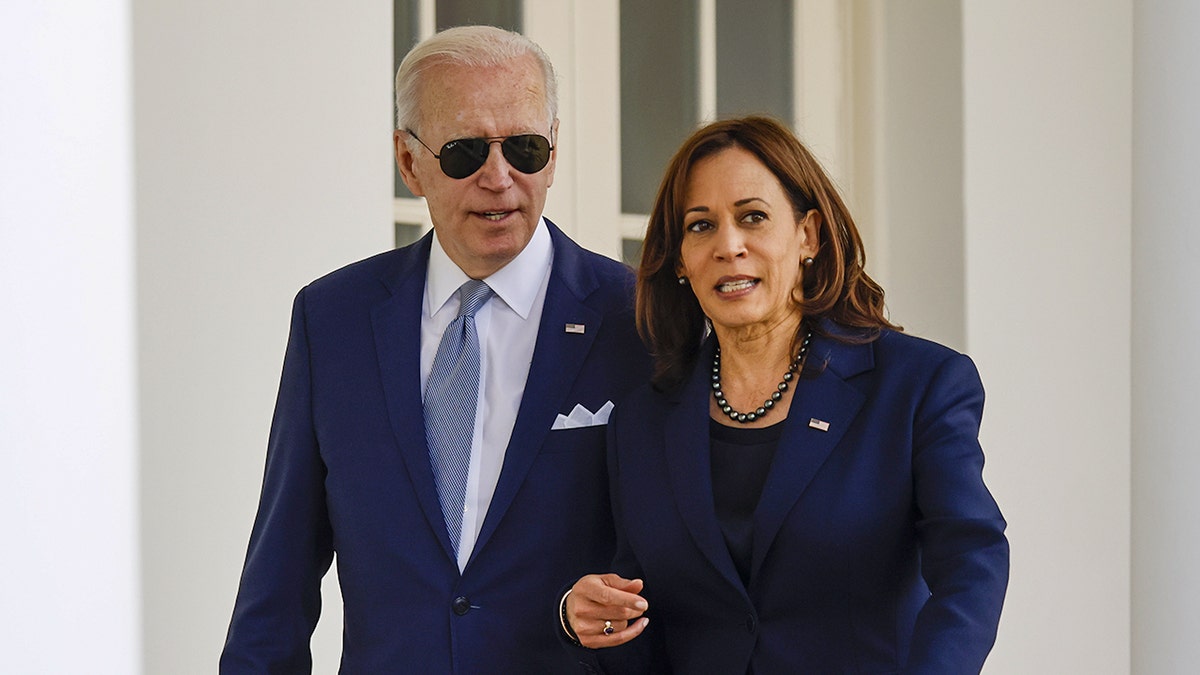
Then-President Joe Biden and then-Vice President Kamala Harris walk through the Colonnade of the White House in Washington, D.C., on Monday, April 11, 2022. (Ting Shen/Bloomberg via Getty Images)
In May, leaked audio from Biden’s interview with former special counsel Robert Hur showed the president struggling with key memories, including when his son Beau died, when he left the vice presidency, why he had classified documents he shouldn’t have had and more.
The audio was leaked after more than a year of congressional lawmakers demanding its release amid questions about the former president’s memory lapses and mental acuity.
Meanwhile, the White House Counsel’s Office and the Justice Department are probing Biden’s use of the autopen and whether signatures were printed at his direction or at the discretion of his senior staff.
An autopen is a machine that physically holds a pen and features programming to imitate a person’s signature. Unlike a stamp or a digitized print of a signature, the autopen has the capability to hold various types of pens, from a ballpoint to a permanent marker, according to descriptions of autopen machines available for purchase.
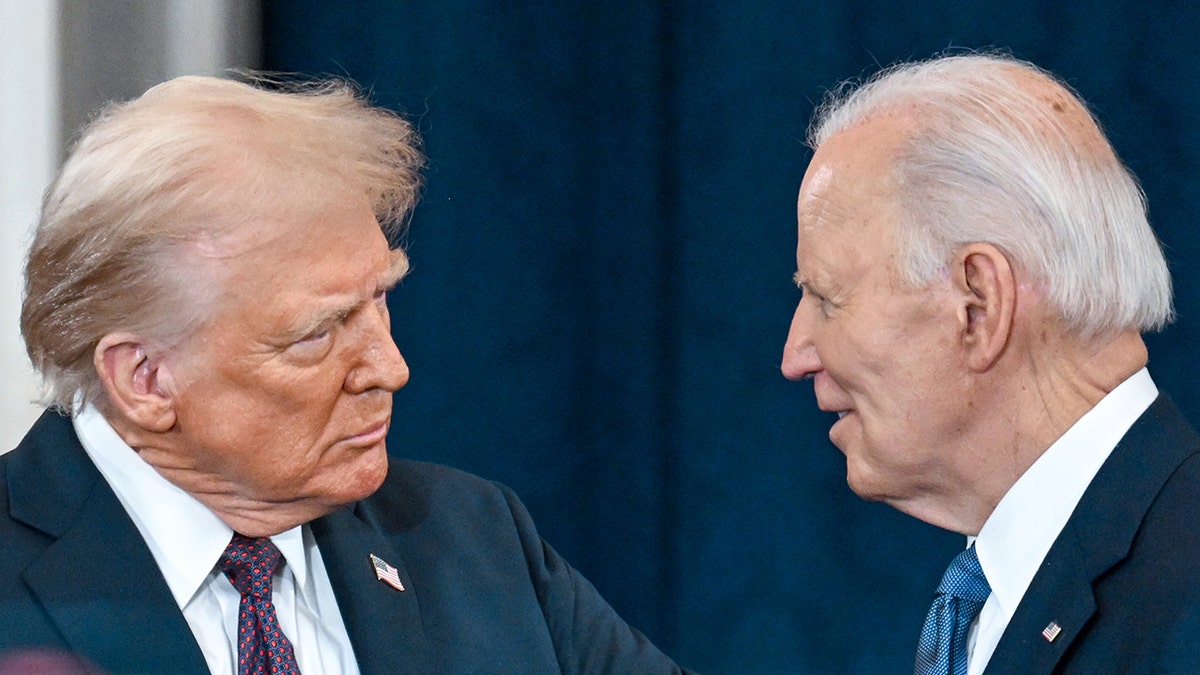
Then-President-elect Donald Trump shakes hands with then-President Joe Biden at Trump’s inauguration in the U.S. Capitol Rotunda on Jan. 20, 2025 in Washington, D.C. (Kenny Holston-Pool/Getty Images)
Biden used the autopen to sign a slew of documents while in office. He also used the autopen to sign final pardons, including preemptive pardons for members of his family, Dr. Anthony Fauci, Gen. Mark Milley and members and staff of the House committee investigating the Jan. 6, 2021 Capitol riots. He only signed one pardon by hand, for his son Hunter, after vowing to the American people for months he would not do so.
CLICK HERE TO GET THE FOX NEWS APP
In his final weeks in office, Biden granted clemency and pardoned more than 1,500 individuals, in what the White House described at the time as the largest single-day act of clemency by a U.S. president.
Over on Capitol Hill, the House Oversight Committee is probing a cover-up of Biden’s declining mental health, subpoenaing a number of former Biden officials for testimony and the Senate Subcomittee on Investigations is requesting NARA records relating to Biden’s declining mental and physical health.
Fox News’ Paul Steinhauser contributed to this report.
INTERNACIONAL
Tragedia en Brasil: una mujer murió y cuatro personas fueron internadas luego de ir a una clase de natación

Una mujer de 27 años murió y varias personas fueron hospitalizadas después de una clase de natación en un gimnasio de la ciudad brasileña de San Pablo.
El caso ocurrió el sábado 7 de febrero y está siendo investigado por la Policía Civil de San Pablo. Las primeras investigaciones apuntan a una posible intoxicación por productos químicos utilizados en la pileta.
Leé también: Una mujer denunció que su hija de 3 años fue golpeada con una pala por otro nene del jardín: “Fue horrible”
Quién era la víctima fatal
La víctima fue identificada como Juliana Faustino Bassetto, una maestra que participaba de la actividad junto a su esposo, Vinicius Oliveira, cuando comenzó a presentar síntomas graves.
Según testigos, durante la clase los alumnos percibieron un olor fuerte y extraño en el agua, además de un sabor químico intenso. Poco después, varios participantes manifestaron ardor en ojos y garganta, dificultad para respirar, náuseas y vómitos.
Juliana fue trasladada de urgencia a un hospital, donde sufrió un paro cardiorrespiratorio y murió. Su esposo permanece internado en estado grave en cuidados intensivos. “El paciente se encuentra grave, pero clínicamente estable”, indicaron en un parte médico. Juliana murió de un paro cariorrespiratorio y su marido, Vinicius, se encuentra internado en estado grave. (Foto: captura de video/ND Mais).
Entre los afectados también se encuentra un adolescente de 14 años, que debió recibir asistencia mcánica por complicaciones respiratorias, además de otros dos adultos que fueron hospitalizados por síntomas de intoxicación.
La principal hipotésis: una intoxicación química
La principal hipótesis que manejan los investigadores es que se produjo una mezcla inadecuada o una dosificación incorrecta de productos químicos utilizados para el tratamiento del agua de la piscina habría generado la liberación de gases tóxicos en un ambiente cerrado.
Cámaras de seguridad del gimnasio muestran a un hombre mezclando y manipulando productos químicos dentro del área de la piscina, mientras los alumnos estaban en el agua. La policía apunta a una mala manipulación de producción químicos como causante de la intoxicación. (Foto: captura de video Globo TV).
Otra cámara de seguridad grabó el momento en que Juliana comenzó a descomponerse. En el video se puede ver a la mujer, todavía en traje de baño, en el hall de entrada del gimnasio, gesticulando como si le faltara el aire. Luego su marido se siente al lado de ella. Minutos después, la joven se levanta con la ayuda de otras personas y la sacan del gimnasio.
En ese preciso momento aparece el hombre que manipulaba los químicos sin remera y con un paño cubriéndole el rostro.
Leé también: Peleó dos años en Ucrania y regresó a la Argentina para reclutar soldados: “Les pido que vuelvan, aunque sea en pedazos”
El caso es investigado por el 42° Distrito Policial de San Pablo como muerte sospechosa y atentado contra la salud pública.
Según la policía, el empleado dejó la mezcla preparada junto a la pileta , esperando a que terminara la clase para echarla al agua.
“Era la última clase. Así que este hombre tomó la preparación, la mezcla, y la colocó cerca de la piscina porque estaba esperando a que terminara la clase para echar el producto al agua, que estaba bastante turbia”, dijo el comisario Alexandre Bento al sitio g1. La hipótesis es que, al estar el ambiente cerrado, los gases ascendieron y las personas se asfixiaron.
Según el jefe de policía, el esposo de la maestra se dio cuenta y empezó a advertir a todos. “Gracias al esposo de Juliana, quien se dio cuenta rápidamente y empezó a pedir a la gente que abandonara la piscina, no hubo más muertos”, dijo.
“El niño de 14 años está hospitalizado y respira con ayuda de máquinas; el esposo de Juliana está hospitalizado en estado grave; y tenemos dos víctimas que ya fueron dadas de alta y se encuentran bien. En total, son cinco”, dijo.
Según el jefe policial, el gimnasio funciona en el barrio desde hace muchos años, pero la gestión actual es reciente. Juliana Faustino Bassetto tenía 27 años y era docente. (Foto: gentileza g1).
“El gimnasio del barrio es bastante antiguo, pero la nueva administración es reciente, de unos dos años. La empresa no tenía licencia de funcionamiento. Las instalaciones eléctricas son precarias . Por lo tanto, todo esto se investigará en la investigación”, afirmó.
En el lugar se secuestraron muestras del agua de la pileta y un balde con una sustancia química que será sometida a peritajes para determinar su composición y posible toxicidad.
De acuerdo con las primeras informaciones policiales, el mantenimiento de la piscina no habría estado a cargo de un técnico especializado, sino de un empleado que cumplía otras funciones dentro del establecimiento. Este punto es clave para establecer eventuales responsabilidades penales.
Irregularidades del gimnasio
Tras el incidente, la Subprefectura de Vila Prudente informó que el gimnasio fue clausurado debido a irregularidades documentales.

El gimnasio fue clausurado tras la muerte de la mujer. (Foto: gentileza g1).
Según las autoridades, el gimnasio no estaba habilitado y las inspecciones iniciales indicaron que las condiciones de seguridad son inadecuadas.
La empresa responsable del gimnasio emitió un comunicado en el que expresó su pesar por lo ocurrido y aseguró estar colaborando con las autoridades. No obstante, familiares de la víctima cuestionaron el accionar del lugar y señalaron posibles negligencias en los protocolos de seguridad y en la atención brindada durante la emergencia.
Brasil, intoxicación
INTERNACIONAL
‘I Voted’ sticker helps convict noncitizen who cast ballot in 2024 as election security debate heats up

NEWYou can now listen to Fox News articles!
A Colombian woman living in Massachusetts was convicted on a series of federal identity theft and identity fraud charges, including voting illegally in the 2024 presidential election, the Justice Department said.
Federal officials have pointed to the case as a rare, documented example of noncitizen voting prosecuted at the highest level, highlighting it amid renewed debate over voter identification, citizenship verification and election security ahead of the 2026 midterms.
The Colombian national, Lina Maria Orovio-Hernandez, was convicted on federal charges of identity theft, passport fraud and illegal voting, including in the 2024 presidential election. She was captured on surveillance video displaying an «I Voted» sticker on Election Day, underscoring what Justice Department officials characterized as a flagrant disregard for U.S. laws.
«Her actions were not a one-time mistake or accident,» the U.S. Department of Housing and Urban Development’s Special Agent in Charge Shawn Rice said in a statement.
WATCHDOG SOUNDS ALARM OVER POTENTIAL NONCITIZEN VOTING AND FOREIGN INFLUENCE AHEAD OF MIDTERMS
Pam Bondi, U.S. attorney general, speaks during a news conference at the Department of Justice in Washington, D.C., on Wednesday, Feb. 12, 2025. (Bloomberg via Getty Images)
Officials have highlighted Orovio-Hernandez’s case as an example of successful interagency cooperation and enforcement, as election security concerns have intensified in the run-up to the 2026 midterms.
The verdict «sends a clear message: identity theft and fraud against federal benefit programs will not go undetected or unpunished,» said Amy Connelly, special agent in charge of the Social Security Administration Office of Inspector General in Boston.
The Trump administration, for its part, has touted her conviction as an example of the pitfalls of weak voter identification standards or vetting procedures.
Officials in several U.S. states have already moved to tighten their individual verification standards and procedures in hopes of cracking down on any fraudulent voting efforts and shoring up voter confidence.
SUPREME COURT UPHOLDS PENNSYLVANIA PROVISIONAL BALLOT RULING, IN A MAJOR LOSS FOR GOP
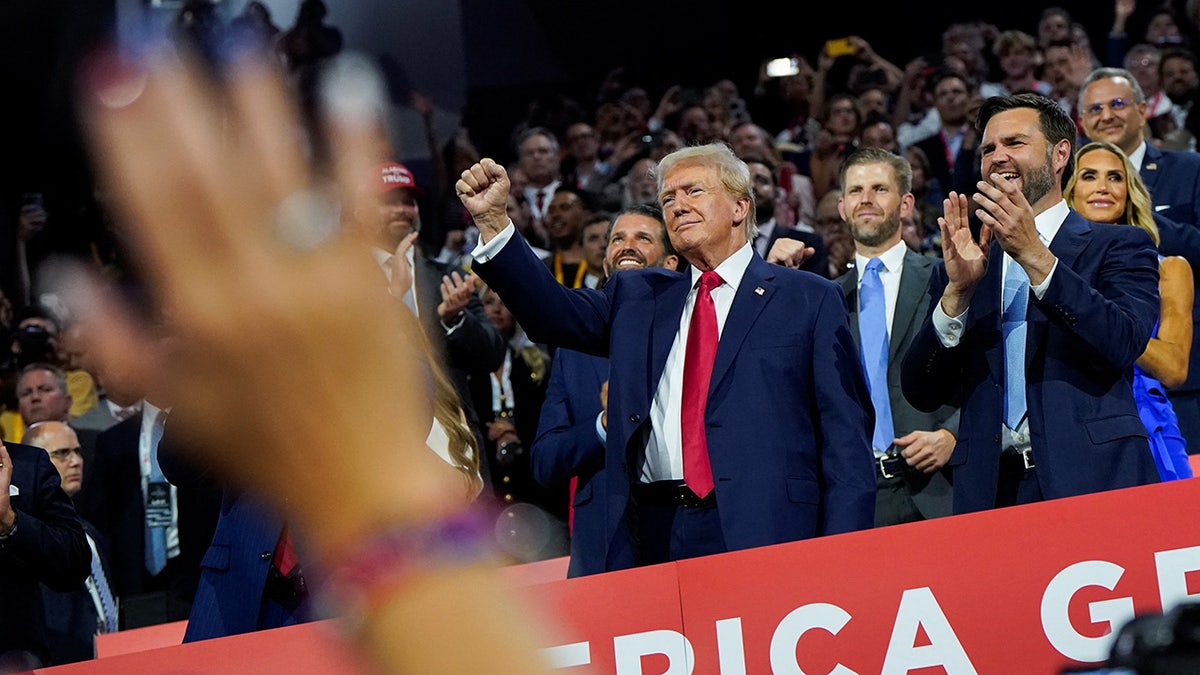
Then-candidate President Donald Trump raises his fist during the Republican National Convention in Milwaukee, Wisconsin, on July 15, 2024. (REUTERS/Elizabeth Frantz)
The conviction comes amid renewed scrutiny of election administration nationwide, including a recent FBI raid at an election hub in Fulton County, Georgia, that authorized a broad seizure of election records, voting rolls and other data tied to the 2020 election, according to a copy of the warrant.
Some Senate Democrats have cited concerns over the news that Director of National Intelligence Tulsi Gabbard was present at the raid, though she stressed in a letter obtained by Fox News Digital that the ODNI’s Office of General Counsel «has found my actions to be consistent and well within my statutory authority as the Director of National Intelligence.»
BEHIND-THE-SCENES BATTLES: LEGAL CHALLENGES THAT COULD IMPACT THE VOTE BEFORE ELECTION DAY BEGINS
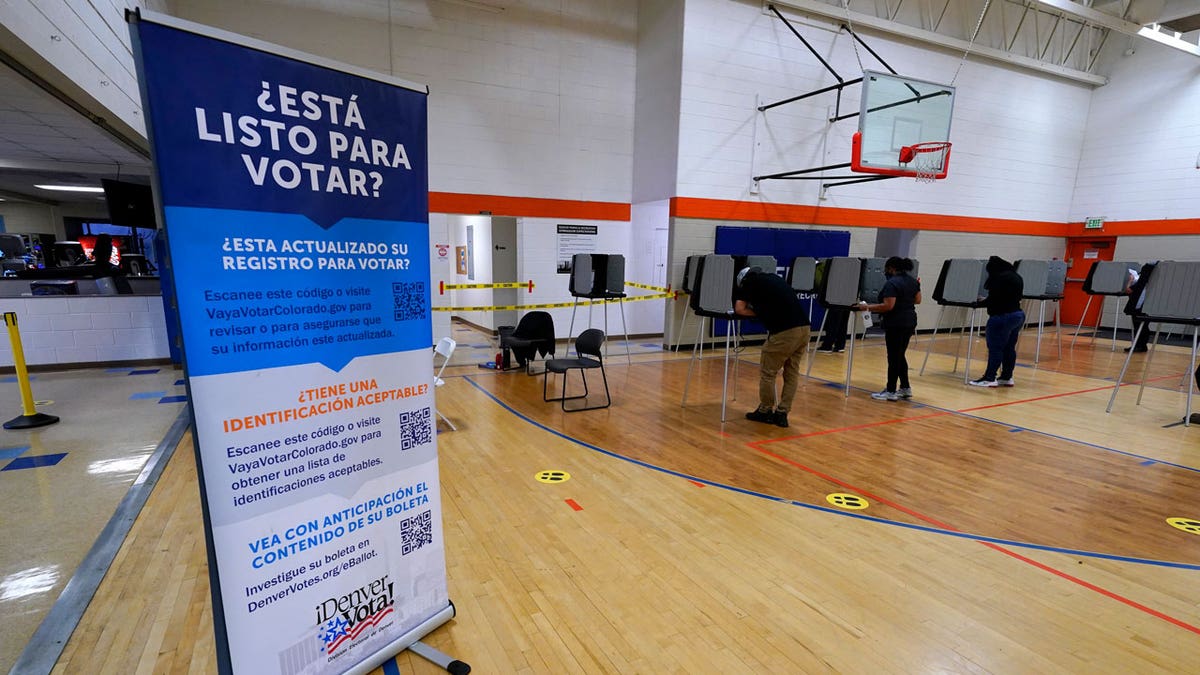
A Spanish-language voting sign is seen at a Denver polling location. (AP Photo/David Zalubowski, File)
The Republican Party has sought to embrace a new, litigation-focused «election integrity» strategy in the months ahead of the 2024 general election, as party officials told Fox News Digital at the time.
The effort saw dozens of lawsuits that sought to crack down on voter identification laws, tighten citizenship verification standards and add new requirements for mail-in ballots and provisional ballots accepted by certain states.
CLICK HERE TO GET THE FOX NEWS APP
It is unclear to what degree the party might seek to replicate this effort ahead of the midterm elections.
donald trump,politics,supreme court,federal courts,immigration
INTERNACIONAL
BID proyecta más de US$1,000 millones en inversiones para Panamá en 2026
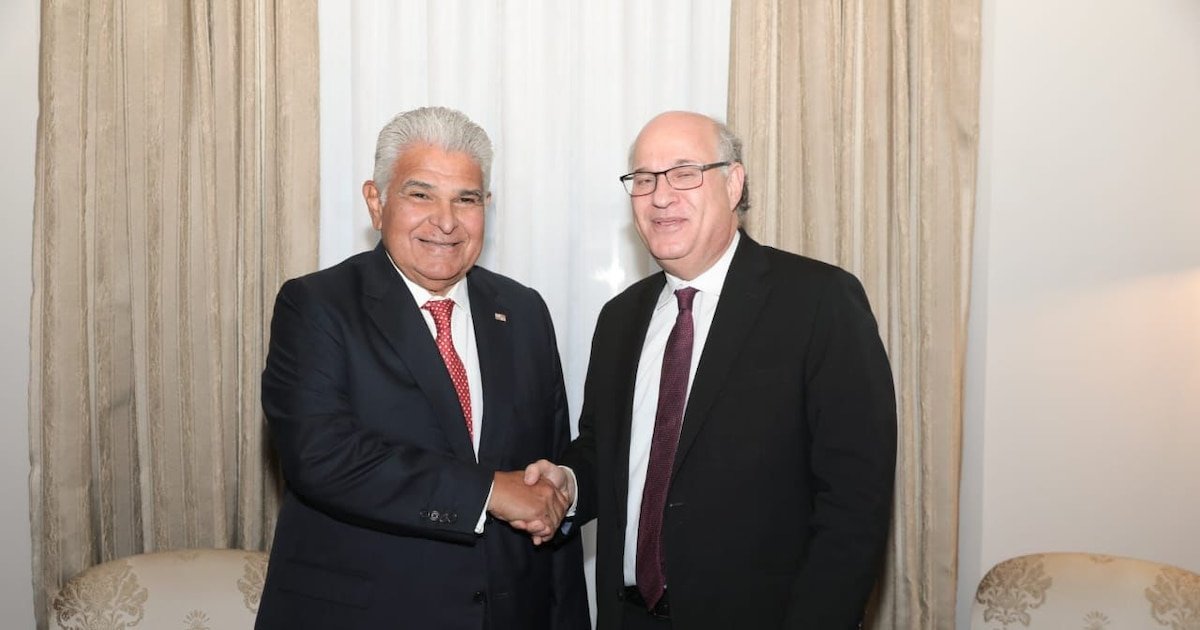
Panamá y el Banco Interamericano de Desarrollo (BID) reforzaron su agenda de cooperación de cara a 2026 tras una reunión sostenida entre el presidente José Raúl Mulino y el presidente del Grupo BID, Ilan Goldfajn, en el marco de la 39ª Reunión de Gobernadores del Istmo Centroamericano y República Dominicana.
El encuentro estuvo centrado en estabilidad macroeconómica, integración regional y crecimiento sostenible, en un momento en que Panamá busca consolidar su atractivo para la inversión internacional.
Durante la reunión, ambas partes coincidieron en que la confianza de los mercados, la disciplina fiscal y el fortalecimiento institucional son pilares clave para sostener el crecimiento económico.
En ese contexto, el Grupo BID reiteró su disposición a respaldar proyectos estratégicos mediante financiamiento complementario, incluyendo esquemas de asociaciones público-privadas y garantías para movilizar capital privado hacia sectores prioritarios.
Uno de los anuncios más relevantes se produjo tras el encuentro, cuando Goldfajn confirmó que el programa del BID para Panamá en 2026 superará los US$1.000 millones entre operaciones públicas y privadas.
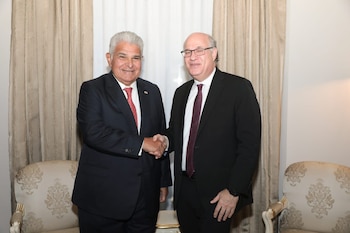
La cifra incluye recursos para infraestructura, servicios públicos, modernización del Estado y apoyo al sector productivo, consolidando al organismo como uno de los principales socios financieros del país.
El propio presidente del BID destacó este compromiso en un mensaje difundido en redes sociales, en el que subrayó que el paquete de financiamiento busca respaldar las prioridades estratégicas del Gobierno panameño.
Entre ellas figuran el acercamiento a la OCDE, la mejora del clima de negocios y el impulso a proyectos regionales bajo el programa “América en el Centro”, orientado a reducir costos logísticos y fortalecer la competitividad.
En materia educativa, Mulino invitó formalmente al BID a participar en el proceso de modernización del sistema educativo, con énfasis en tecnología y digitalización.
La propuesta fue acogida favorablemente, y el organismo anunció que trabaja junto con Google en un programa regional que contempla 60.000 becas, del cual Panamá figura entre los principales beneficiarios, con miras a cerrar brechas en habilidades digitales.
La agenda abordó también proyectos estructurales como la interconexión eléctrica con Colombia, el desarrollo del centro logístico de Puerto Armuelles, obras de agua potable y saneamiento, y planes de integración regional. Goldfajn informó, además, que el BID puso a disposición asistencia técnica para fortalecer la gobernanza, la transparencia y la adopción de estándares internacionales en la gestión pública.
El respaldo del organismo se refleja en una amplia cartera de proyectos financiados en Panamá en los últimos años.

Entre ellos figuran el apoyo al desarrollo del Metro de Panamá y el cable aéreo de San Miguelito, programas de saneamiento en el área metropolitana, iniciativas de acceso universal a la energía, proyectos ambientales en la Bahía de Parita, y planes de fortalecimiento para microempresarios y pueblos indígenas.
Estas operaciones han abarcado sectores como transporte, agua, energía, inclusión social y modernización institucional.
En el ámbito fiscal, los datos oficiales muestran que el BID se mantiene como uno de los principales acreedores multilaterales del país. Al cierre de 2025, el saldo de la deuda con el organismo superaba los US$4.400 millones, dentro de un componente multilateral cercano a los US$9.700 millones.
Esta relación financiera convierte al BID en un actor clave tanto en el financiamiento del desarrollo como en la sostenibilidad de las cuentas públicas.
Desde el Ejecutivo, Mulino ha defendido que la estrategia con el BID no se limita al endeudamiento, sino que apunta a generar retornos económicos y sociales mediante proyectos productivos, mejoras en servicios básicos y fortalecimiento institucional.
El mandatario ha insistido en que los recursos deben traducirse en empleo, competitividad y mayor inclusión, evitando que se conviertan en una carga estructural para las finanzas públicas.

En el plano regional, Goldfajn resaltó que la elección de Panamá como sede del encuentro de ministros de Finanzas y autoridades económicas refleja su papel como articulador regional. Según el BID, el país se perfila como un eje estratégico para impulsar soluciones conjuntas en logística, energía, comercio e infraestructura, en un entorno marcado por la volatilidad global y los desafíos geopolíticos.
Los ministros de Economía y Hacienda de Centroamérica se darán cita este martes en Ciudad de Panamá en el marco de la 39ª Reunión de Gobernadores del Istmo Centroamericano, Panamá y República Dominicana, organizada por el Banco Interamericano de Desarrollo (BID).
El encuentro tendrá como sede el Centro de Convenciones de Panamá, ubicado a orillas del Canal, y reunirá a autoridades responsables de las políticas fiscales, financieras y de desarrollo de la región.
Entre los asistentes confirmados figuran el presidente José Raúl Mulino, el ministro de Economía y Finanzas, Felipe Chapman, y sus homólogos de Costa Rica, El Salvador, Guatemala y Honduras, además de presidentes de bancos centrales y altos funcionarios del área económica.
La agenda contempla discusiones sobre productividad, integración regional, finanzas públicas y adaptación al cambio climático, en un contexto de presiones fiscales y desaceleración en varios países.
También participará el presidente del BID, Ilan Goldfajn, junto a representantes de BID Invest y BID Lab, con el objetivo de articular iniciativas conjuntas entre el sector público y privado.
Las autoridades regionales prevén que este foro sirva para coordinar estrategias comunes, atraer inversión internacional y fortalecer la cooperación financiera, en momentos en que Panamá busca consolidarse como plataforma de diálogo económico y centro logístico del istmo.
corresponsal:Desde Panamá

 ECONOMIA2 días ago
ECONOMIA2 días agoEl sector industrial advierte que la apertura económica exige eliminar las distorsiones internas

 CHIMENTOS3 días ago
CHIMENTOS3 días agoMirtha Legrand se quebró desconsolada al hablar de la renuncia de Jimena Monteverde a su mesaza

 DEPORTE3 días ago
DEPORTE3 días agoCentral Córdoba vs. Unión: formaciones, hora y dónde ver por tv















